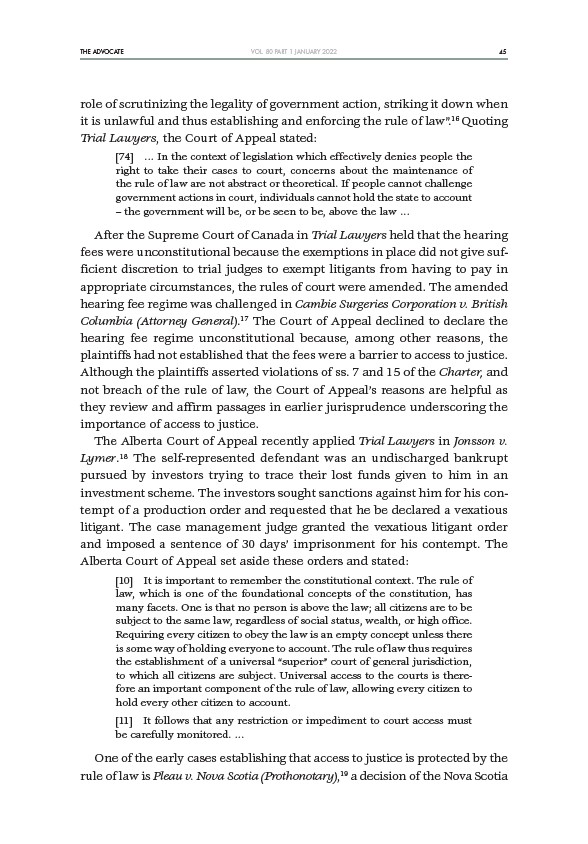
THE ADVOCATE 45
VOL. 80 PART 1 JANUARY 2022
role of scrutinizing the legality of government action, striking it down when
it is unlawful and thus establishing and enforcing the rule of law”.16 Quoting
Trial Lawyers, the Court of Appeal stated:
74 … In the context of legislation which effectively denies people the
right to take their cases to court, concerns about the maintenance of
the rule of law are not abstract or theoretical. If people cannot challenge
government actions in court, individuals cannot hold the state to account
– the government will be, or be seen to be, above the law …
After the Supreme Court of Canada in Trial Lawyers held that the hearing
fees were unconstitutional because the exemptions in place did not give sufficient
discretion to trial judges to exempt litigants from having to pay in
appropriate circumstances, the rules of court were amended. The amended
hearing fee regime was challenged in Cambie Surgeries Corporation v. British
Columbia (Attorney General).17 The Court of Appeal declined to declare the
hearing fee regime unconstitutional because, among other reasons, the
plaintiffs had not established that the fees were a barrier to access to justice.
Although the plaintiffs asserted violations of ss. 7 and 15 of the Charter, and
not breach of the rule of law, the Court of Appeal’s reasons are helpful as
they review and affirm passages in earlier jurisprudence underscoring the
importance of access to justice.
The Alberta Court of Appeal recently applied Trial Lawyers in Jonsson v.
Lymer.18 The self-represented defendant was an undischarged bankrupt
pursued by investors trying to trace their lost funds given to him in an
investment scheme. The investors sought sanctions against him for his contempt
of a production order and requested that he be declared a vexatious
litigant. The case management judge granted the vexatious litigant order
and imposed a sentence of 30 days’ imprisonment for his contempt. The
Alberta Court of Appeal set aside these orders and stated:
10 It is important to remember the constitutional context. The rule of
law, which is one of the foundational concepts of the constitution, has
many facets. One is that no person is above the law; all citizens are to be
subject to the same law, regardless of social status, wealth, or high office.
Requiring every citizen to obey the law is an empty concept unless there
is some way of holding everyone to account. The rule of law thus requires
the establishment of a universal “superior” court of general jurisdiction,
to which all citizens are subject. Universal access to the courts is therefore
an important component of the rule of law, allowing every citizen to
hold every other citizen to account.
11 It follows that any restriction or impediment to court access must
be carefully monitored. …
One of the early cases establishing that access to justice is protected by the
rule of law is Pleau v. Nova Scotia (Prothonotary),19 a decision of the Nova Scotia